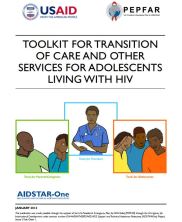Increasing numbers of perinatally infected children are surviving to adolescence and adulthood. This group is emerging as a unique population and a unique challenge for policy makers, programmers and service providers, thus requiring attention and a stronger understanding of their unique needs to support their continued health and development.
This toolkit is designed to support healthcare and community care providers, families, caregivers, and the adolescents themselves with the transition of care, support and transition services from pediatric to adult care. A trainer's manual for health care providers is also included.
This toolkit is a guide that assists both HCPs and CCPs to tailor a package of services for ALHIV. HCPs and CCPs are the primary users of the Toolkit, and they should use the Toolkit and distribute content/tools as appropriate to the adolescent and the family/caregiver.
THE TOOLKIT PROVIDES:
1. A framework to promote self-care: The key checklists provide a framework for transition to self-care and should be reviewed on a semiannual basis to set and review self-management goals and to determine if the adolescent is on track. As you use the key checklists, please note that male and female adolescent clients may experience transition differently and may have different strengths and barriers associated with health care.
2. A framework for a minimum package of services: Utilize the modules within the Toolkit only as they are needed. Some adolescents will utilize several modules throughout the transition period while others may only require minimal resources from the Toolkit. The provider should only utilize the Toolkit as it is relevant to the adolescent and his or her family/caregiver. JSI/AIDSTAR-One, 2014


